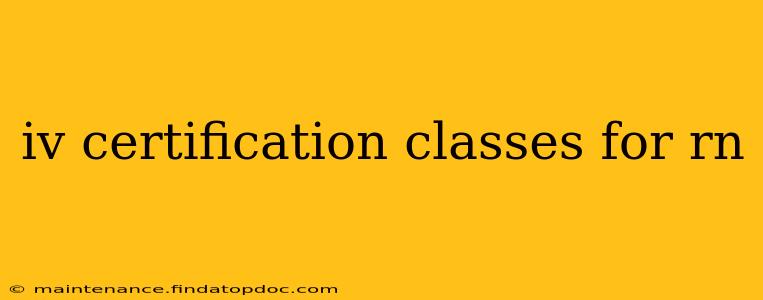Registered Nurses (RNs) play a vital role in patient care, and administering intravenous (IV) therapy is a crucial skill for many. This guide explores IV certification classes for RNs, covering various aspects to help you find the best program for your needs and career advancement. Whether you're a new grad needing initial IV training or a seasoned RN looking to refresh your skills or expand your competencies, understanding your options is key.
What are IV Certification Classes for RNs?
IV certification classes for RNs provide focused training on the safe and effective administration of intravenous medications and fluids. These classes go beyond the basic IV training often included in nursing school, offering advanced techniques, updated guidelines, and practical, hands-on experience. The specific content varies depending on the provider, but generally includes theoretical knowledge and practical skills development. Completion often leads to a certificate demonstrating competency in IV therapy.
Why Pursue IV Certification?
There are several compelling reasons why RNs pursue IV certification:
- Enhanced Skill Set: Advanced IV skills are highly valued by employers and can open doors to more specialized roles and career advancement opportunities.
- Increased Job Opportunities: Many healthcare settings require or prefer nurses with IV certification, especially in areas like oncology, critical care, or emergency medicine.
- Higher Earning Potential: Nurses with specialized skills and certifications often command higher salaries.
- Improved Patient Care: Advanced training ensures you can administer IV therapy safely and effectively, minimizing risks and improving patient outcomes.
- Increased Confidence: Mastering IV therapy builds confidence and competence, making you a more valuable asset to your healthcare team.
What Topics are Typically Covered in IV Certification Classes?
The curriculum for IV certification classes can vary, but common topics generally include:
- IV Therapy Principles: Understanding the physiology of intravenous fluid administration, medication compatibility, and potential complications.
- Types of IV Catheters and Cannulas: Learning about different catheter sizes, insertion techniques, and appropriate selection based on patient needs.
- Insertion Techniques: Hands-on practice with inserting peripheral IV catheters, following proper aseptic technique and patient safety protocols.
- Fluid and Medication Calculations: Accurate calculations are critical; classes typically include dosage calculations and fluid balance monitoring.
- Complications and Management: Identifying and responding to potential complications such as infiltration, phlebitis, and infection.
- Legal and Ethical Considerations: Understanding legal and ethical guidelines surrounding IV therapy, including informed consent and documentation.
- Advanced Techniques (often in specialized courses): This may include PICC line insertion, central line care, or specific medication administration techniques.
Where Can I Find IV Certification Classes for RNs?
Several avenues exist for obtaining IV certification, including:
- Hospitals and Healthcare Systems: Many hospitals and healthcare systems offer internal training programs for their staff.
- Community Colleges and Vocational Schools: These institutions frequently offer courses that lead to IV certification or certificates of completion.
- Nursing Continuing Education Providers: Numerous organizations specialize in providing continuing education for nurses, offering various IV certification courses, often online or hybrid formats.
- Private Training Companies: Some companies specialize in IV therapy training and certification.
How Much Do IV Certification Classes Cost?
The cost of IV certification classes varies depending on the provider, location, and course length. Prices can range from a few hundred dollars to several thousand dollars for more intensive or advanced programs.
How Long Does it Take to Complete an IV Certification Class?
The duration of IV certification courses can range from a few days to several weeks, depending on the intensity and depth of the curriculum. Some courses are completed entirely online, while others may involve a combination of online and in-person components.
Are IV Certification Classes Worth it for RNs?
For many RNs, the benefits of IV certification significantly outweigh the costs. The enhanced skills, improved job prospects, and increased earning potential make it a worthwhile investment in your career. The enhanced patient care you can provide is another significant benefit.
What are the prerequisites for IV Certification Classes?
Prerequisites may vary, but generally, you'll need to be a licensed Registered Nurse (RN) in good standing. Some courses may require specific experience or prior training in related areas. It's crucial to check the specific requirements for each program you're considering.
By carefully considering your needs and researching available programs, you can find an IV certification class that helps you advance your career and enhance your skills as a Registered Nurse. Remember to check accreditation and reviews before enrolling.
